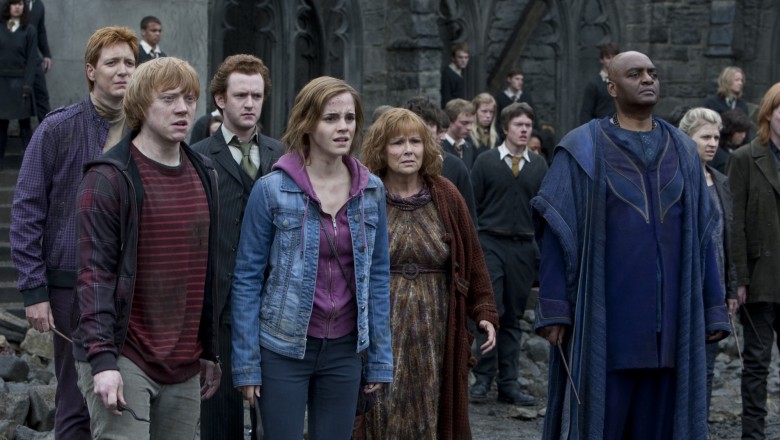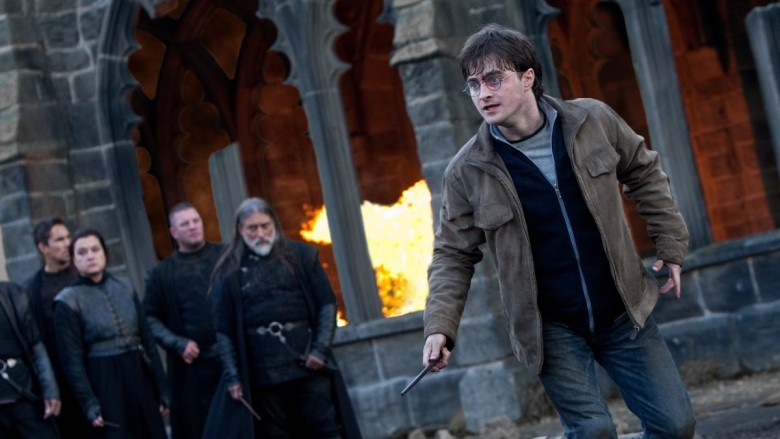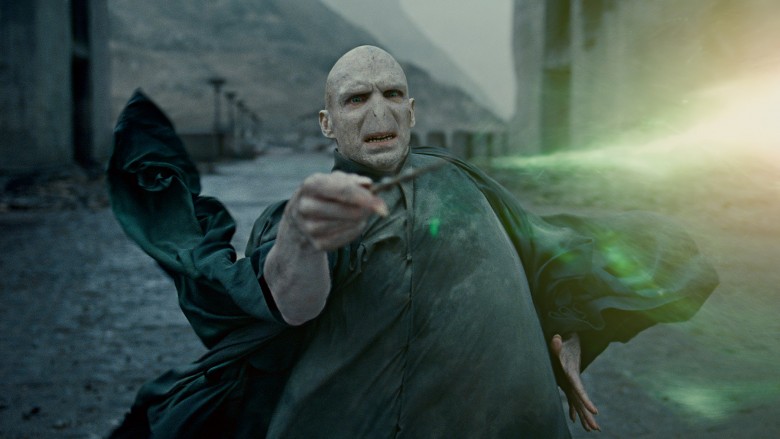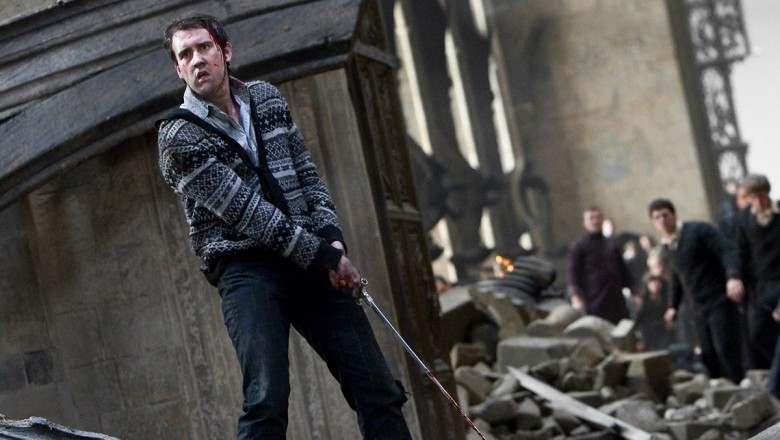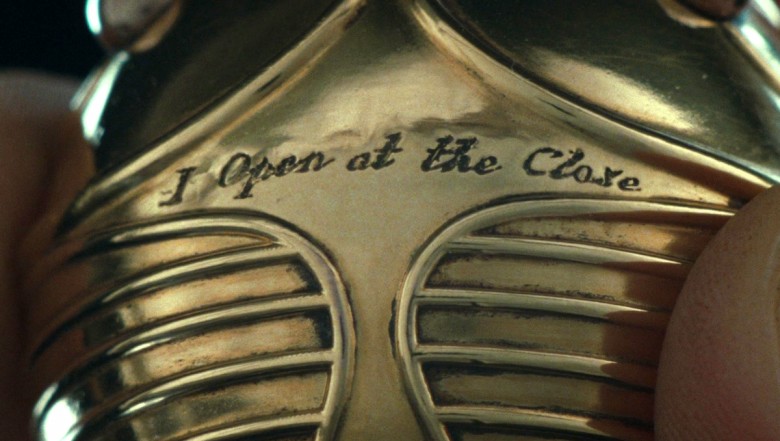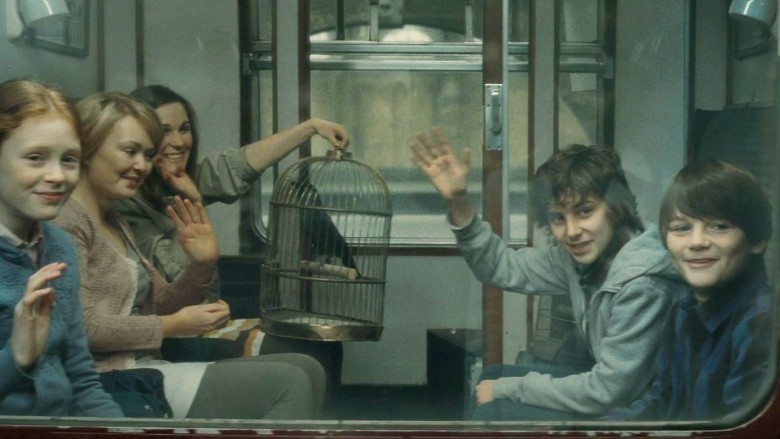The Ending Of Harry Potter Finally Explained
For millions across the globe, the Harry Potter book and film series was the closest thing they'd ever come to experiencing actual magic. The journey of the young wizard, from a stowaway orphan who lived under the stairs at his cruel aunt's home into the prophesied hero who defeated the world's darkest villain, was nothing short of epic. The final installment of the story was as complex and — at times — bleak as it needed to be, to wrap up seven chapters' worth of sorcerer storytelling.
So, to make sure you caught everything important there at the end, let's shed a little lumos light on everything that happened in the conclusion to the Harry Potter saga.
Snape's true side
In the opening shot of Harry Potter and the Deathly Hallows – Part 2, dementors loomed over Hogwarts Castle, and Professor Snape — who'd never exactly been the cheery sort himself — observed from on high how much devastation the Dark Lord's looming presence had caused his school. Students marched in silence without glee. His new administrative minions, the Carrow siblings, wreaked havoc on the students themselves, and long gone were the halcyon days when the worst thing that could happen to a young wizard was costing his house some precious points.
Snape spent a long time — a lifetime, by the measure of Harry's existence — running subterfuge for Dumbledore, but his true loyalties were never quite clear until his final moments. After being banished from the school by Professor McGonagall after Harry's return, he was killed by Voldemort's trusty sidekick snake Nigiri, so the Dark Lord could take true ownership of the Elder Wand (more on that later). Harry, overhearing the attack, tried to rush in and help him after Voldemort apparated away, but it was too late. Instead, Snape got a split-second to give him a teardrop full of memories, so that he could show him his gut-wrenching backstory of unrequited love of Harry's mum Lily.
More importantly, he showed him how he'd always been looking out for "the boy" by feigning allegiance to the Dark Lord. The only reason he murdered Dumbledore was because the headmaster was already dying from wearing Marvolo's Gaunt Ring (with the Resurrection Stone), and he didn't want Draco to be forced to do it at Voldemort's demand. And his obvious contempt for Harry at Hogwarts was due to his similarity to his pseudo-bully dad James, but despite his distaste for those personality traits, he really was trying to protect Harry all the while, so he could fulfill his destiny to defeat the Dark Lord.
Harry died -- yes, really
As had been foreseen for years, Harry Potter was always meant to die in his big battle with Voldemort. It's why Dumbledore took such a hefty role in his upbringing and education, and why he was always special around the wizarding world. Professor Trelawney spookily predicted the dark future ahead of the Boy Wizard early on in his magical career, but Harry himself didn't quite understand his deep, physical connection with You Know Who until Snape shared his memories with Harry, and confirmed that Harry was the final horcrux made by Voldemort.
After he successfully vanquished the Helga Hufflepuff's cup and the Diadem of Rowena Ravenclaw (two of the last remaining horcruxes), and tasked Hermione and Ron with killing the snake, Harry set off on what he knew would be a suicide mission, to allow Voldemort to strike him with an Avada Kedavra spell in the forest.
He didn't exactly know what would happen after that, of course, but he trusted the late headmaster enough to follow his lead, even unto his deathbed if needed be, despite what Albus' own doubtful brother had to say about it. But it wouldn't be the end for the Boy Who Lived after all, because ...
He didn't need the Resurrection Stone
Upon going gentle into that good night, Harry awakened in what appeared to be a milky white vision of King's Cross Station, where he'd hopped onto Platform 9¾ so many times before. Dumbledore awaited him with news that he'd successfully killed off the part of Voldemort that remained inside of him in the process of dying, and that he had a choice to board a train back to the realm of the living or to just move on ... to where, he didn't say.
Harry, knowing his battle wasn't done, opted for the former. He left behind the scaly, fetal version of Voldemort that had infected his brain for so long, and used his perceived death to gain an advantage as Hagrid carried him back to the school, with an unknowing Voldemort bragging about his conquest to garner new recruits from the ravaged student pool.
The Elder Wand was his all along
No matter how many horcruxes Harry and his friends successfully destroyed, Voldemort was still a more powerful wizard than him, so when Harry arose from the dead to pick a final fight with the Dark Lord, he was handily overtaken by Voldemort. But Voldemort still couldn't kill him a second time with the wand, even after he'd taken ownership from Snape. Why? Well, it turned out that Snape wasn't the one who'd gained control of the Elder Wand in the first place, so it didn't pass to Voldemort upon Snape's execution by Nagini.
Sure, Snape had killed Dumbledore and taken possession of the wand in Half-Blood Prince, but it was Draco who'd originally disarmed Dumbledore, and thus received the allegiance of the Elder Wand. Then, when Harry disarmed him in their subsequent duel, it was Harry who'd laid claim to the Elder Wand's efficacy. So, while the Elder Wand was successfully used to strike its master down in the forest, when Harry had thoroughly surrendered himself, he still wasn't disarmed of the wand in that battle. So, it remained loyal to Harry, instead of Voldemort. When Voldemort tried to cast a death curse on him a second time, this time against its owner's wishes, it was a no-go. This is how the fight got dragged out long enough for ...
A key weapon presented itself
The Sword of Gryffindor had been an instrumental tool in destroying horcruxes throughout Harry Potter lore. Dumbledore used it to destroy the Gaunt family ring. Harry retrieved it from the frozen lake, after it presented itself to him, and Ron used it to destroy the locket that was causing his buddy so much mental anguish. Despite knowing its powers, Harry offered the sword to Griphook in exchange for him helping them get into Bellatrix Lestrange's vault at Gringotts, and he made good on his end of the bargain.
Griphook returned to villainy soon after, though, and left Harry and his friends in a lurch, by abandoning them in the vault caverns with no promise to get them out. Hermione, always with a clever idea up her gown sleeve, led the trio to ride a dungeon-bound dragon out of the bank, with Griphook perishing in the fiery skirmish that ensued. The sword then disappeared from his grip, to present itself to a more worthy pair of hands.
Later on, when Hermione and Ron were back at Hogwarts trying to lure Nagini away from Voldemort, to destroy what was one of the final remaining horcruxes, the Sword presented itself to Neville Longbottom by way of the Sorting Hat, so he could slice the snake's head off and give Voldemort one last crucial blow before he did his ultimate battle with Harry. Unlike other weapons of its ilk, the Sword knew no master, and simply chose whoever was worthiest at the time. And few were more worthy than Neville.
The Deathly Hallows come together at last
There was an interesting Easter egg contained in Harry's first shot of the last film. As he's mourning by Dobby's beachfront grave, he looked in a triangular fragment of a mirror the elf had possessed — thanks to the circular nature of his glasses, it created the symbol of the Deathly Hallows in the reflection. It was a wink to how all three elements would eventually be his to do with what he wished.
The Deathly Hallows — as Part 1 explained in animated format — consisted of the Elder Wand, the Cloak of Invisibility, and the Resurrection Stone. When combined, the three gave a wizard untold power, the ability to disappear from Death's purview, and a means to bring back lost souls. Voldemort got his hands on one — the Elder Wand — while Harry had been casually given the cloak in his earliest days at Hogwarts, not knowing its strength. He eventually recovers the Stone, too, after kissing his Snitch goodbye with the intention of sacrificing himself.
Unlike Voldemort, though, Harry didn't aim to use these items for world domination once he came into possession of all three. Instead, he snapped the Elder Wand in half, dropped the Resurrection Stone in the Forbidden Forest to be trampled into the dirt by a centaur, and he kept the cloak for himself because, well, that had always been a good source of fun. Plus, it was something that belonged to his late father. He'd later pass the Cloak down to his own son, James Sirius Potter — James' younger brother, Albus Severus, would later lift it in the events of The Cursed Child.
Speaking of which ...
The next generation
In the 19-years-ahead epilogue to Deathly Hallows, we met Harry Potter's trio of children with Ginny Weasley — with particular attention paid to Albus Severus Potter, his second son, as he prepared to board the Hogwarts Express for his start at the school. The boy was warring with the possibility that he might be sorted into House Slytherin, but Harry kindly told him that he'd succeed wherever he ended up and that he could choose Gryffindor if it meant that much to him.
Little did we know at the time of release, but this was the intro to a new generation of wizarding journeys, which plays out on the stage, in Rowling's Harry Potter and the Cursed Child. But that's another ending to the story altogether.
Was it all in his head?
There's a popular fan theory that everything that happened to Harry Potter outside of Privet Drive was a mental machination of his young, abused mind, and Deathly Hallows did little to dispel that theory. In fact, while at the heavenly version of King's Cross Station, Harry asked Dumbledore if it was all in his mind and his headmaster (a fitting title, considering this particular subject) told him that it was, but that didn't make it any less real.
So, was the entirety of the Harry Potter universe fiction, coming from the imagination of a desperate boy who lived under the stairs and who wished for something more? Very possibly so.

